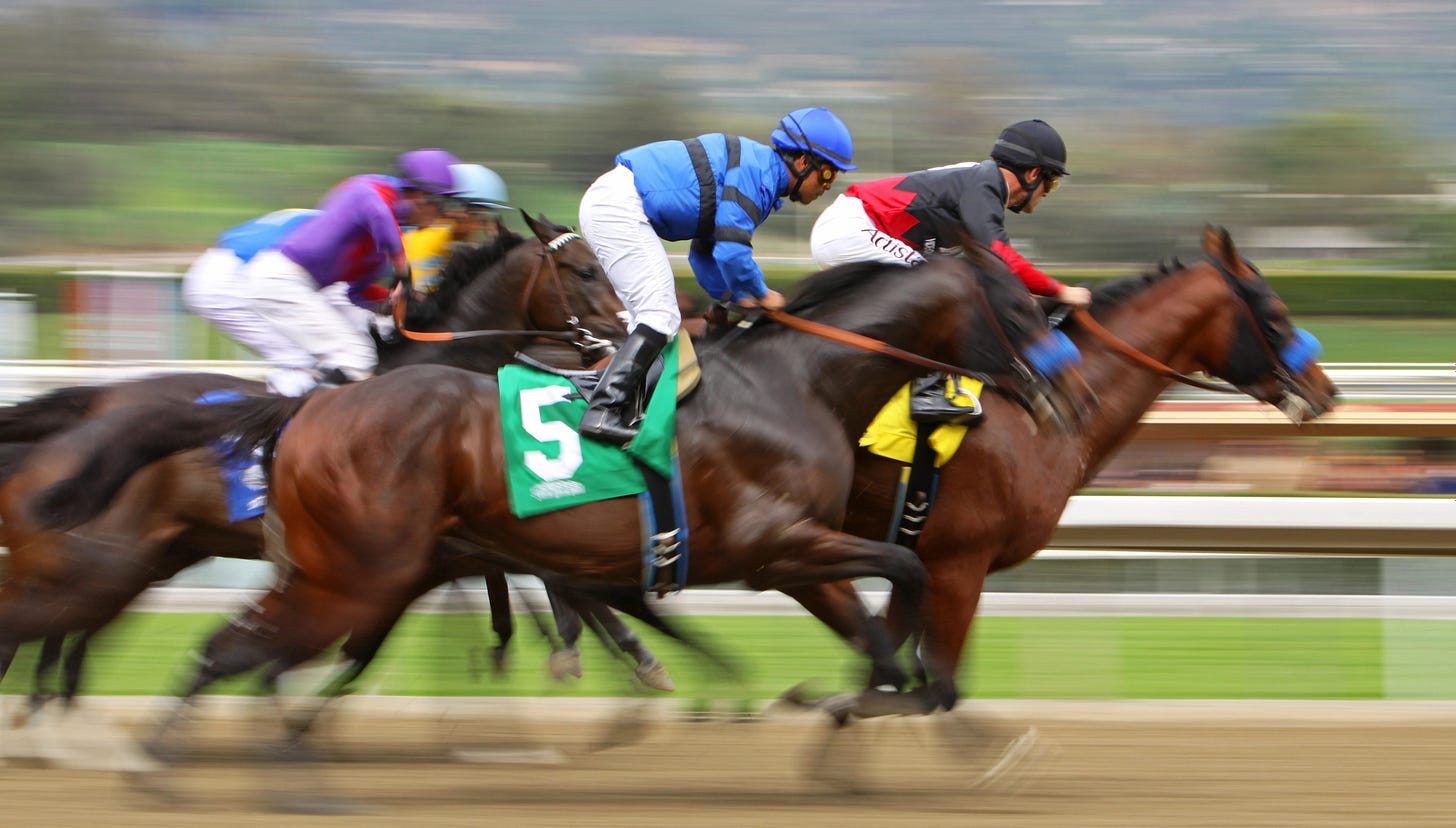
The world of horse racing is a captivating spectacle. Imagine thundering hooves pounding the earth, the electrifying roar of the crowd as a champion surges toward the finish line, and the promise of life-changing million-dollar purses. For centuries, horse racing has enthralled audiences with its blend of athletic prowess, strategic horsemanship, and high-stakes drama.
‘‘Beyond the thrill of horse racing lies a dark truth. Animals pushed to the limit, lax regulations, and environmental strain raise ethical concerns. Educate yourself and advocate for reform to ensure a brighter future for racehorses.’’
However, beneath the glittering surface lies a complex and often troubling reality. This article peels back the layers to expose the ethical, environmental, and economic concerns that cast a long shadow over the industry. We will dive right into the dark side of horse racing, exploring the hidden costs to the animals, the environment, and even the communities that surround racetracks.
Myth 1: Horse Racing is Safe and Humane for the Animals
Fact Check: Welfare Concerns
Racehorses are pushed to their physical limits, leading to a high incidence of injuries. Broken bones, internal bleeding, and cardiac issues are common. A study by the University of California, Davis found that catastrophic injuries occur in roughly 1.5 out of every 1,000 race starts https://www.vetmed.ucdavis.edu/news/uc-davis-efforts-contribute-continued-decline-california-racehorse-fatalities. Further compromising their well-being is the routine use of drugs. Performance-enhancing substances and pain medications can have long-term health consequences, while also undermining the integrity of the sport.
Veterinary and Insider Perspectives
Veterinarians often raise concerns about the physical stress racing places on horses' bodies. An article in the Journal of the American Association of Equine Practitioners highlights the risks associated with racing, noting the significant strain placed on the musculoskeletal system https://thehorse.com/115028/ethical-issues-for-racetrack-practitioners-aaep-2012/. Whistleblower accounts and insider testimonies expose instances of neglect, overtraining, and improper use of medications. These practices prioritize profit over animal welfare.
Myth 2: The Industry is Highly Regulated to Ensure Fairness and Safety
Fact Check: Regulatory Shortfalls
Regulations often have loopholes allowing unethical practices to flourish. Oversight and enforcement vary greatly between racing jurisdictions, creating a patchwork system with significant gaps. A report by the Australian RSPCA identifies inconsistencies in regulations and enforcement across different states https://kb.rspca.org.au/knowledge-base/what-are-the-animal-welfare-issues-with-thoroughbred-horse-racing/.
Corruption and Exploitation
Doping scandals and manipulation of breeding practices highlight the corruption that can permeate the industry. A 2015 investigation by The New York Times exposed widespread doping in American horse racing https://www.nytimes.com/topic/subject/drugs-in-horse-racing. This exploitation prioritizes financial gain over fair competition and animal welfare.
Myth 3: Horse Racing is an Economic Boon for Communities
Fact Check: Economic Impact
The industry touts job creation and tourism as economic benefits. However, these need to be weighed against costs. Taxpayer subsidies prop up struggling racetracks, and environmental damage caused by facilities requires cleanup. The financial viability of many tracks is questionable, with overreliance on often-volatile betting revenue.
Community and Environmental Impact
Racetracks can negatively impact communities through land use disruption and environmental degradation. The strain on local infrastructure and resources is another concern. An article from the BBC explores the environmental impact of horse racing tracks, including issues with manure management and water usage https://www.bbc.co.uk/sport/horse-racing/61968354.
Myth 4: Horse Racing Provides a Dignified Retirement for Horses
Fact Check: Retirement and Aftercare
The fate of retired racehorses is often grim. Many end up neglected or even slaughtered for meat, despite unsuitable physical condition. A report by The Guardian details the challenges faced by retired racehorses, with many ending up in slaughterhouses https://www.theguardian.com/australia-news/2023/oct/10/nsw-retired-horses-racing-racehorses-nsw-stats-unknown. Existing aftercare programs struggle with limited resources and reach.
Alternative Models
Successful models for horse aftercare exist, focusing on rehabilitation and retraining for second careers. Organizations like the Thoroughbred Retirement Foundation provide sanctuary and retraining opportunities for retired racehorses https://www.trfinc.org/ These offer a stark contrast to the practices prevalent in mainstream racing.
Conclusion: Call for Transparency and Reform
The horse racing industry requires greater transparency. Reforms are needed to address the ethical, environmental, and economic issues outlined here. Increased oversight, stricter regulations against doping, and robust aftercare programs are crucial starting points.
Public Awareness and Action
Educate yourselves about the realities of horse racing. Consider supporting ethical alternatives like equestrian sports that prioritize animal welfare. Lobby your legislators for stricter regulations and support organizations advocating for reform.
Further Reading and Resources
Books: "Black Beauty" by Anna Sewell, "The Death and Life of the Great American Racehorse" by Laura Hillenbrand
Documentaries: "Dark Horse" (2015), "Luck" (2011)
Organizations: The Pegasus Foundation https://pegasusfoundation.org/
, The Humane Society of the United States https://www.humanesociety.org/
Visit Our Amazon Store!
All sales of our Vegan Products help promote animal rights worldwide!
General Resources
Books:
Dominion: The Power of Animals in Nature and in Our Imagination by Matthew Scully
Animal Liberation by Peter Singer
Eating Animals by Jonathan Safran Foer
A Billion Hungry Mouths: Feeding the World Without Consuming the Planet by Colin Tudge
Websites and organizations:
Documentaries:
Articles:
"The Case for Animal Rights" by Tom Regan
‘‘Why We Love Dogs, Eat Pigs, and Wear Cows: An Introduction to Carnism’’ by Melanie Joy
‘‘Animal Rights: The Abolitionist Approach’’ by Gary L. Francione
‘‘Fellow Creatures: Our Obligations to the Other Animals’’ by Christine Korsgaard
Seeds of Compassion: Finding Jesus Christ in a Vegan World by Michael Corthell
Receive a single informative article daily at 12:01 AM by email. Explore my homepage with exciting vegan and plant-based news content and delightful and delicious recipes for additional updates. Stay connected to the vegan world and all it has to offer.
Visit The Vegan Project Global our Facebook page for more vegan outreach and education.
Also, visit our new YouTube channel
The information on this vegan/plant-based blog is for general informational purposes only. It is not intended as legal, medical, or professional advice. Readers should consult with appropriate professionals for specific advice tailored to their situation. The blog owner is not responsible for any reliance on the information herein.




